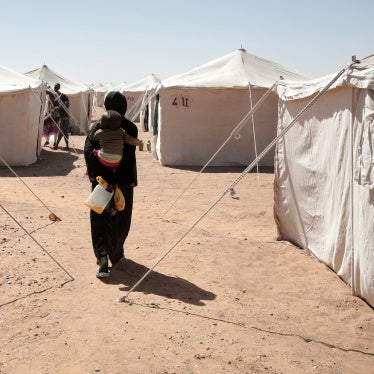Since the Seleka rebel coalition seized power in March 2013, the Central African Republic has been in the grip of a grave human rights and humanitarian crisis. Human Rights Watch, since April 2013, has documented widespread burning and pillaging of villages, extrajudicial executions, rape, and the recruitment of children as soldiers by Seleka forces. In August 2013, Christian anti-balaka militia, in an attempt to seize power and retaliate against the predominantly Muslim Seleka, began to target Muslim residents, whom they accused of supporting the Seleka. Human Rights Watch has investigated the cycle of sectarian violence since then.
In early December, the anti-balakalaunched large-scale attacks on Seleka forces in Bangui and Bossangoa, killing both Seleka and Muslim civilians. In turn, heavily armed Seleka exacted revenge on Christian civilians. By January 10, Interim President Michel Djotodiaresigned; Seleka members and Muslim civilians now face greater vulnerability to attack. Muslim residents have fled rural areas to gather in provincial capitals and secondary trading towns, but these locales are now also under threat.
Anti-balaka, for example, reportedly massacred some 30-40 ethnic Peuhl residents just 10 days ago in Boyali, a trading center 140km north of Bangui. There were also reports of widespread Seleka reprisals and village burnings in Bozoum. In Bangui, according to OCHA, roughly 350,000 people, about half the city’s population, have been displaced by sectarian fighting. People across the country are living in dire conditions in makeshift camps without basic shelter, food, water, and medical supplies. Hundreds of thousands are hiding in the bush, an unknown number dying of preventable diseases, hunger, and exposure. Aid agencies are unable to reach many of these desperate people.
The African Union and French peacekeeping forces (MISCA) have brought some degree of civilian protection, but lack sufficient capacity to contain the human rights and humanitarian disaster in the Central African Republic. As has already been envisaged in the Security Council resolution, the United Nations should step in. Rapid support for the UN Secretary-General proposal to transform the AU force into a full-fledged multi-dimensional UN mission would be the best option for re-establishing CAR’s stability and protecting civilians.
We are concerned by reports that Chadian troops, as part of MISCA, are involved in human rights violations and clashes against demonstrators. This was flagged in the recent High Commissioner’s report, the result of a December field mission by OHCHR staff. The UN should fully and urgently investigate such reports and take measures to prevent any future abuse. The report also highlights the very serious human rights crisis in CAR, and the need for more comprehensive monitoring of the abuses being committed.
The holding of this special session and the early nomination of the Independent Expert are positive steps. The Independent Expert will need to work with all parties to ensure the immediate cessation of attacks on civilians, forced displacement, the destruction or looting of civilian property, and the killing or mistreatment of individuals in custody. The Council should support the work of the Expert and ensure that it continues to send an unequivocal message to all parties that there will be no impunity for crimes committed against the civilian population.







